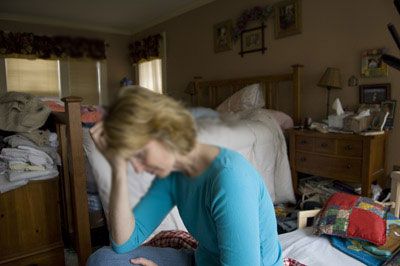"Garbage in, garbage out" is a phrase used for computer inputs and outputs, but it works for describing depression, too. Often the bad or negative events that happen in our lives on the outside -- the garbage -- have an effect on our insides. Health suffers, sleep is disrupted and the brain changes as the garbage comes in -- much like an input of data going into a computer. Our brains handle the processing of all of the events of our lives and what comes out of us may be a release of some of that garbage in a healthy way.
Sometimes, however, it comes out, or manifests itself, in depression. So much has happened or been taken in that the brain and body settle into a depressed state, and it can stay there for the short term or the long term. Depression has many causes, symptoms and forms, and sometimes it's even a result of good events happening in our lives. A baby's birth may be joyous and overwhelming at the same time, for instance, and it's not so much a case of "garbage in" but more of an adjustment to all of the life changes that come with having a baby. There's just a lot of new "stuff" to deal with.
Advertisement
Reactive depression is a short-term variety, and it's also called situational depression or adjustment disorder. All three ways of referring to this type of depression -- "relational," "situational" and "adjustment" -- help describe how and what it is: a depression resulting from a situation that occurs, or that's related to events in a person's life, that requires a time of adjustment to handle the changes and implications.
Clinical, or major depression, is often chemical; the brain doesn't have the needed chemical balance to right itself. There may be too much or too little of the components that control moods and correction requires medication and/or professional therapy to achieve balance and beat the depression. Sometimes, depression needs to be managed long-term with continual adjustments of medications and psychotherapy to keep depression at bay depending on other factors in a person's life.
For example, someone who suffers from clinical depression will likely face more obstacles if they have a job loss, lose a family member or have a health problem or injury. Reactive depression to the specific stressors can piggyback on top of the clinical depression and a new or possibly more aggressive treatment plan may be needed. Although any form of depression is life altering, clinical depression can be all-consuming and debilitating, affecting all areas of daily living. Often, suicidal thoughts are persistent, too. Reactive depression may have periods that seem like clinical depression and have the same symptoms or even chemical triggers, but thankfully, it often is less severe and runs its course in about six months or less [source: Hall-Flavin].
How can you tell the difference between reactive and clinical depression? We'll look at some causes and symptoms, next.
Advertisement


